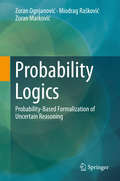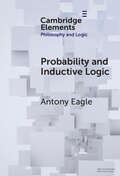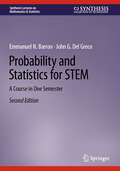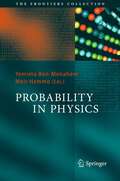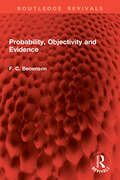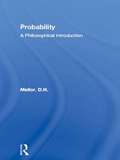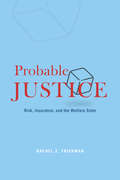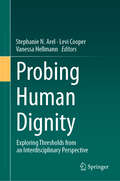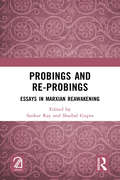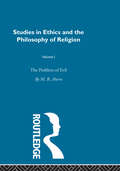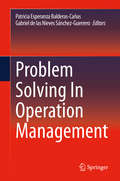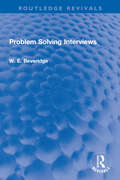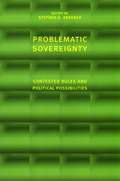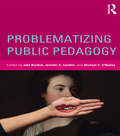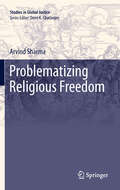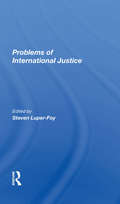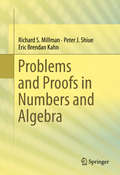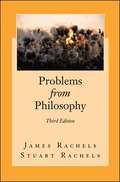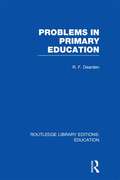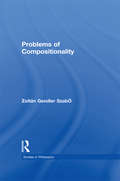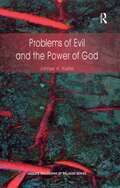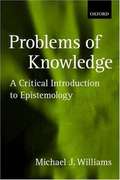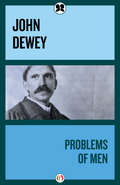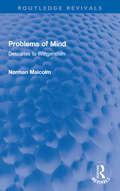- Table View
- List View
Probability Logics
by Zoran Ognjanović Miodrag Rašković Zoran MarkovićThe aim of this book is to provide an introduction to probability logic-based formalization of uncertain reasoning. The authors' primary interest is mathematical techniques for infinitary probability logics used to obtain results about proof-theoretical and model-theoretical issues such as axiomatizations, completeness, compactness, and decidability, including solutions of some problems from the literature. An extensive bibliography is provided to point to related work, and this book may serve as a basis for further research projects, as a reference for researchers using probability logic, and also as a textbook for graduate courses in logic.
Probability and Evidence
by Paul HorwichIn this volume, which was originally published in 1982, Paul Horwich presents a clear and unified approach to a number of problems in the philosophy of science. He diagnoses the failure of other attempts to resolve them as stemming from a too-rigid, all-or-nothing conception of belief, and adopts instead a Bayesian strategy, emphasising the degree of confidence to which we are entitled the light of scientific evidence. This probabilistic approach, he argues, yields a more complete understanding of the assumptions and procedures characteristic of scientific reasoning. It also accounts for the merits of simplicity, severe tests and surprising predictions, and provides a way in which the dispute between the realist and instrumentalist views of science might be resolved. The result is a crisp, well-focused contribution to the philosophy of science. The elaboration of an important conception of probability will stimulate anyone with an interest in the field.
Probability and Inductive Logic (Elements in Philosophy and Logic)
by Antony EagleReasoning from inconclusive evidence, or 'induction', is central to science and any applications we make of it. For that reason alone it demands the attention of philosophers of science. This element explores the prospects of using probability theory to provide an inductive logic: a framework for representing evidential support. Constraints on the ideal evaluation of hypotheses suggest that the overall standing of a hypothesis is represented by its probability in light of the total evidence, and incremental support, or confirmation, indicated by the hypothesis having a higher probability conditional on some evidence than it does unconditionally. This proposal is shown to have the capacity to reconstruct many canons of the scientific method and inductive inference. Along the way, significant objections are discussed, such as the challenge of inductive scepticism, and the objection that the probabilistic approach makes evidential support arbitrary.
Probability and Statistics for STEM: A Course in One Semester (Synthesis Lectures on Mathematics & Statistics)
by Emmanuel N. Barron John G. Del GrecoThis new edition presents the essential topics in probability and statistics from a rigorous standpoint. Any discipline involving randomness, including medicine, engineering, and any area of scientific research, must have a way of analyzing or even predicting the outcomes of an experiment. The authors focus on the tools for doing so in a thorough, yet introductory way. After providing an overview of the basics of probability, the authors cover essential topics such as confidence intervals, hypothesis testing, and linear regression. These subjects are presented in a one semester format, suitable for engineers, scientists, and STEM students with a solid understanding of calculus. There are problems and exercises included in each chapter allowing readers to practice the applications of the concepts.
Probability in Physics
by Meir Hemmo Yemima Ben-MenahemWhat is the role and meaning of probability in physical theory, in particular in two of the most successful theories of our age, quantum physics and statistical mechanics? Laws once conceived as universal and deterministic, such as Newton's laws of motion, or the second law of thermodynamics, are replaced in these theories by inherently probabilistic laws. This collection of essays by some of the world's foremost experts presents an in-depth analysis of the meaning of probability in contemporary physics. Among the questions addressed are: How are probabilities defined? Are they objective or subjective? What is their explanatory value? What are the differences between quantum and classical probabilities? The result is an informative and thought-provoking book for the scientifically inquisitive.
Probability, Objectivity and Evidence (Routledge Revivals)
by F. C. BenensonFirst published in 1984, in Probability, Objectivity and Evidence the author claims that the theory of probability provides a single, correct, analysis of probability and that the concept of probability employed in science can best be understood as that of inductive probability; to do so, it is necessary to show both how the logical relation theory of probability can be given a formulation sufficiently objective for the purposes of science, and how other attempts to explain the objective character of probability judgements are unsatisfactory.These and related questions occupy the first five chapters of the book. The last two chapters contain more or less independent material on the principle of indifference. The author argues that in essence, the logical relation theory alone can explain how we have objective knowledge of probabilities, and so it alone provides a viable system translation of the concept of probability used in science. This is a must read for students of logic and philosophy.
Probability: A Philosophical Introduction
by D.H. MellorProbability: A Philosophical Introduction introduces and explains the principal concepts and applications of probability. It is intended for philosophers and others who want to understand probability as we all apply it in our working and everyday lives. The book is not a course in mathematical probability, of which it uses only the simplest results, and avoids all needless technicality. The role of probability in modern theories of knowledge, inference, induction, causation, laws of nature, action and decision-making makes an understanding of it especially important to philosophers and students of philosophy, to whom this book will be invaluable both as a textbook and a work of reference. In this book D. H. Mellor discusses the three basic kinds of probability – physical, epistemic, and subjective – and introduces and assesses the main theories and interpretations of them. The topics and concepts covered include: * chance * frequency * possibility * propensity * credence * confirmation * Bayesianism. Probability: A Philosophical Introduction is essential reading for all philosophy students and others who encounter or need to apply ideas of probability.
Probable Justice: Risk, Insurance, and the Welfare State
by Rachel Z. FriedmanDecades into its existence as a foundational aspect of modern political and economic life, the welfare state has become a political cudgel, used to assign blame for ballooning national debt and tout the need for personal responsibility. At the same time, it affects nearly every citizen and permeates daily life—in the form of pension, disability, and unemployment benefits, healthcare and parental leave policies, and more. At the core of that disjunction is the question of how we as a society decide who should get what benefits—and how much we are willing to pay to do so. Probable Justice traces a history of social insurance from the eighteenth century to today, from the earliest ideas of social accountability through the advanced welfare state of collective responsibility and risk. At the heart of Rachel Z. Friedman’s investigation is a study of how probability theory allows social insurance systems to flexibly measure risk and distribute coverage. The political genius of social insurance, Friedman shows, is that it allows for various accommodations of needs, risks, financing, and political aims—and thereby promotes security and fairness for citizens of liberal democracies.
Probing Human Dignity: Exploring Thresholds from an Interdisciplinary Perspective
by Stephanie N. Arel Levi Cooper Vanessa HellmannProbing Human Dignity from multiple disciplinary backgrounds by scholars from a variety of countries and different cultures is an intense intellectual and emotional venture. The intensity emerges from an encounter with Human dignity that challenges individuals, communities, and society at large to navigate different spheres of human action, including ethical, moral, religious, and legal realms. Difficulties arise in the attempt to bridge the conversation about Human Dignity across cultures and traditions. This volume addresses such difficulties, exploring new horizons of the discourse and offering a mosaic of the quest for Human Dignity. Alas, the denial of a person’s dignity continues to manifest in contemporary life, through injustices often related to personal hardship, crisis, unrest, or upheaval. This collection confronts such injustices with sensitive, complex, nuanced, and academically rigorous engagement. Each chapter begins from the understanding that recognizing and investigating Human Dignity often occurs “at the threshold”, where in times of societal crisis or individual hardship questions of Human Dignity turn into ethical, moral, and legal dilemmas. The objective of this volume is to draw on theoretical and conceptual distinctions of Human Dignity in order to inform new perspectives that probe its ambiguity. The contributors offer greater clarity and push beyond existing thresholds to develop new paradigms that cross disciplinary lines while speaking to the goals and needs of post-modern societies and individuals. Each contributor crosses into new territory to examine a pressing legal or societal issue with a new lens. The authors worked together as an international and interdisciplinary research group within the framework of the 2nd Intercontinental Academia of the UBIAS network (University-Based Institutes for Advanced Studies). This volume reflects their journey, their fruitful collaboration, and their scholarly endeavors. The result is a collection that serves as a fresh and exciting contribution to the contemporary Human Dignity discourse.
Probings and Re-Probings: Essays in Marxian Reawakening
by Sankar Ray'Controversy was the breath of Marx's life and he revelled in it. We are therefore not at all apologetic', wrote Puran Chand Joshi in the preface to Karl Marx: A Symposium, published in 1968 commemorating the 150th birth anniversary of Marx, adding further, (It is) 'in the best Indian tradition to operate with belief and hope that it is only through the clash of ideas that truth emerges.' At a time, when a Marxian renaissance has been taking place in academia, Joshi's words reverberate with a new vitality, an evanescence of 'official Marxism' and official Marxist parties notwithstanding. There is no denying that the so-called Marxists now pay dearly for wavering 'between a rather mechanistic interpretation of crisis and its opposite: the conviction that capitalism could only be overcome by an act of will.' This book is the outcome of an international conference on Karl Marx organised by ADRI in Patna between June 16 and 20, 2018 keeping the new Marxian reality in mind. Over 50 scholars from across the world sent papers to the Conference, covering topics such as economics, politics, society, philosophy, etc. ADRI welcomed them with an open mind in sync with the Marxian reawakening that treats Marx historically and critically. Please note: Taylor & Francis does not sell or distribute the Hardback in India, Pakistan, Nepal, Bhutan, Bangladesh and Sri Lanka.
Problem Of Evil: Vol 1 (Studies In Ethics And The Philosophy Of Religion)
by M. B. AhernFirst published in 2003. Routledge is an imprint of Taylor & Francis, an informa company.
Problem Solving In Operation Management
by Patricia Esperanza Balderas-Cañas Gabriel de las Nieves Sánchez-GuerreroThis volume examines problem solving and applied systems aimed at improving performance and management of organizations. The book’s eight chapters are integrated into two parts: methodologies and techniques that discuss complex dynamic analysis of the organizations, participative processes for building trend scenarios, consultancy as a systemic intervention process, processes to promote innovative goals in organizations, and analytical processes and solid mathematical representation systems. The authors also include a model to urban parks location, an analytic model to urban services location, and a system to forecast demand with fussy sets.Describes methodologies to analyze processes in complex dynamic organizations, including as participative, interventional, innovative, and analytical approaches;Clarifies a strategies for providing structure to complex organizations and applying analytical methods to decision making;Illustrates problem holistic solving strategies;Explains how to approach several problems from a holistic point of view and how analyze the subjacent processes to make decisions.
Problem Solving Interviews (Routledge Revivals)
by W. E. BeveridgeFirst published in 1968, Problem Solving Interviews explores different elements relating to conversations concerned with finding a solution to a particular problem. The book begins first by examining the role of the problem-solving interviewer, before exploring in detail what an interview is. It looks at the significance of different attitudes in shaping behaviour and highlights the importance of considering the attitudes of both the interviewer and the respondent. This leads on to a consideration of bias, including where it comes from, how it can affect the interview, and whether its impact can be eliminated or reduced. The book also covers carrying out and learning how to interview, and includes close analysis of three example interviews.
Problematic Sovereignty: Contested Rules and Political Possibilities
by Stephen KrasnerSome of the most pressing issues in the contemporary international order revolve around a frequently invoked but highly contested concept: sovereignty. To what extent does the concept of sovereignty—as it plays out in institutional arrangements, rules, and principles—inhibit the solution of these issues? Can the rules of sovereignty be bent? Can they be ignored? Do they represent an insurmountable barrier to stable solutions or can alternative arrangements be created? Problematic Sovereignty attempts to answer these and other fundamental questions by taking account of the multiple, sometimes contradictory, components of the concept of sovereignty in cases ranging from the struggle for sovereignty between China and Taiwan to the compromised sovereignty of Bosnia under the Dayton Accord. Countering the common view of sovereignty that treats it as one coherent set of principles, the chapters of Problematic Sovereignty illustrate cases where the disaggregation of sovereignty has enabled political actors to create entities that are semiautonomous, semi-independent, and/or semilegal in order to solve specific problems stemming from competing claims to authority.
Problematizing Public Pedagogy
by Jennifer A. Sandlin Jake Burdick Michael P. O’MalleyThe term ‘public pedagogy’ is given a variety of definitions and meanings by those who employ it. It is often used without adequately explicating its meaning, its context, or its location within differing and contested articulations of the construct. Problematizing Public Pedagogy brings together renowned and emerging scholars in the field of education to provide a theoretical, methodological, ethical, and practical ground from which other scholars and activists can explore these forms of education. At the same time it increases the viability of the concept of public pedagogy itself. Beyond adding a multifaceted set of critical lenses to the genre of public pedagogy inquiry and theorizing, this volume adds nuance to the broader field of education research overall.
Problematizing Religious Freedom
by Arvind SharmaThe concept of religious freedom is the favoured modern human rights concept, with which the modern world hopes to tackle the phenomenon of religious pluralism, as our modern existence in an electronically shrinking globe comes to be increasingly characterised by this phenomenon. To begin with, the concept of religious freedom, as embodied in Article 18 of the Universal Declaration of Human Rights, seems self-evident in nature. It is the claim of this book, however, that although emblematic on the one hand, the concept is also problematic on the other, and the implications of the concept of religious freedom are far from self-evident, despite the ready acceptance the term receives as embodying a worthwhile goal. This book therefore problematizes the concept along legal, constitutional, ethical and theological lines, and especially from the perspective of religious studies, so that religious freedom in the world could be enlarged in a way which promotes human flourishing.
Problems Of International Justice
by Steven Luper-foyWhen the topic of international justice did arise, discussion rarely got beyond recommendations about how nations could avoid war, as well as suggestions about when a declaration of war was morally justifiable and what sorts of methods might be used in the course of a justifiable war the topics of so-called just-war theory. Such is no longer the case.To be sure, just-war theory is reaching greater states of sophistication,much of it focused around Michael Walzer's book Just and Unjust Wars.Excerpts from Walzer's book appear here, in Part Two, along with a set of newly written chapters that deal with issues arising from the use of violence among nations. The topics of these chapters are foreign interventionism and states' rights, deterrence and the threat of nuclear reprisal, and terrorism.But issues of international justice other than just-war theory have been discussed by an an ever-increasing group of twentieth-century scholars. These issues deal with what might be called (for lack of a better term) distributive justice, which concerns the distribution of the world's natural resources and the goods produced by laborers across the world, as well as the duties,rights, and liberties possessed by individuals. How such items ought to be distributed within nation-states has been discussed extensively by social and political philosophers. Only in recent years has any attention been paid to the proper distribution of goods internationally. The chapters in Part One all do so. With one exception, all of these chapters are written for this volume. The exception is an excerpt from Charles Beitz's book PoliticalTheory and International Relations, Part Three of which is reproduced here almost in its entirety. The other chapters in this part are devoted to the topics of justice and the distribution of the world's resources, the obligation to assist the needy, the responsibilities of international corporations, and justice and the global environment.
Problems and Proofs in Numbers and Algebra
by Richard S. Millman Peter J. Shiue Eric Brendan KahnFocusing on an approach of solving rigorous problems and learning how to prove, this volume is concentrated on two specific content themes, elementary number theory and algebraic polynomials. The benefit to readers who are moving from calculus to more abstract mathematics is to acquire the ability to understand proofs through use of the book and the multitude of proofs and problems that will be covered throughout. This book is meant to be a transitional precursor to more complex topics in analysis, advanced number theory, and abstract algebra. To achieve the goal of conceptual understanding, a large number of problems and examples will be interspersed through every chapter. The problems are always presented in a multi-step and often very challenging, requiring the reader to think about proofs, counter-examples, and conjectures. Beyond the undergraduate mathematics student audience, the text can also offer a rigorous treatment of mathematics content (numbers and algebra) for high-achieving high school students. Furthermore, prospective teachers will add to the breadth of the audience as math education majors, will understand more thoroughly methods of proof, and will add to the depth of their mathematical knowledge. In the past, PNA has been taught in a "problem solving in middle school" course (twice), to a quite advanced high school students course (three semesters), and three times as a secondary resource for a course for future high school teachers. PNA is suitable for secondary math teachers who look for material to encourage and motivate more high achieving students.
Problems from Philosophy (3rd Edition)
by Stuart Rachels James RachelsProblems from Philosophy is an introduction to philosophy which is organized around the great philosophical problems—the existence of God, the nature of the mind, human freedom, the limits of knowledge, and the truth about ethics. It begins by reflecting on the life of the first great philosopher, Socrates. Then it takes up the fundamental question of whether God exists. Next comes a discussion of death and the soul, which leads to a chapter about persons. The later chapters of the book are about whether objective knowledge is possible in science and ethics. Each chapter is self-contained and may be read independently of the others. Problems from Philosophy represents the final work of author and philosopher James Rachels. In it, he brings the same liveliness and clarity to the introduction of philosophy that he brings to his best-selling ethics text, The Elements of Moral Philosophy. The second and third edition have been revised by Rachels' son Stuart, who carefully has carefully refined his father's work to further strengthen its clarity and accessibility.
Problems in Primary Education (Routledge Library Editions: Education)
by R F DeardenThe first part of the book discusses aims, who should determine them and how they might be determined. The second part discusses some more specific topics of learning and teaching, such as learning how to learn, the integrated day and the use of competition. The author distinguishes three broad levels of thought in looking at schools: the details of choice and decision; the general principles which are, or ought to be, guiding that detailed practice; and the theoretical commentaries on the guiding principles available from the various disciplines which constitute the study of education.
Problems of Compositionality
by Zoltán Gendler SzabóThis book is a critical discussion of the principle of compositionality, the thesis that the meaning of a complex expression is fully determined by the meanings of its constituents and its structure. The aim of this book is to clarify what is meant by this principle, to show that its traditional justification is insufficient, and to discuss some of the problems that have to be addressed before a new attempt can be made to justify it.
Problems of Evil and the Power of God (Routledge Philosophy of Religion Series)
by James A. KellerWhy do bad things happen, even to good people? If there is a God, why aren't God's existence and God's will for humans more apparent? And if God really does miracles for some people, why not for others? This book examines these three problems of evil - suffering, divine hiddenness, and unfairness if miracles happen as believers claim - to explore how different ideas of God's power relate to the problem of evil. Keller argues that as long as God is believed to be all-powerful, there are no adequate answers to these problems, nor is it enough for theists simply to claim that human ignorance makes these problems insoluble. Arguing that there are no good grounds for the belief that God is all-powerful, Keller instead defends the understanding of God and God's power found in process theism and shows how it makes possible an adequate solution to the problems of evil while providing a concept of God that is religiously adequate.
Problems of Knowledge: A Critical Introduction to Epistemology
by Michael WilliamsProblems of Knowledge provides clear and engaging explanations of the theory of knowledge and why it matters, offering an excellent foundation for students in introductory epistemology courses.
Problems of Men
by John DeweyAlthough primarily addressed to the general reader, the introduction and the last chapters of this work strike straight at reactionary philosophers who obstruct the philosophers who are honest searchers for wisdom.
Problems of Mind: Descartes to Wittgenstein (Routledge Revivals)
by Norman MalcolmFirst published in 1972, Problems of Mind begins with a consideration of the view that the human mind is an immaterial thing that does not require corporeal embodiment for its operations. It takes up the conception that "inner experiences" are "strictly identical" with brain processes. The book also deals exclusively with the doctrine called "Logical Behaviourism", which will always possess a compelling attraction for anyone who is perplexed by the psychological concepts, who has become aware of the worthlessness of an appeal to introspection as an account of how we learn those concepts, and who has no inclination to identify mind with brain. The three most plausible theories of mind-body dualism, mind-brain monism, and behaviourism are all rejected, and nothing is set forth as the true theory. Norman Malcolm states that this is 'only a drop in the bucket. It will serve its purpose if it leads the reader into the writings of Wittgenstein, who is easily the most important figure in the philosophy of mind.’ Problems of Mind will be an essential read for scholars and researchers of philosophy of mind, ethics, logic, and philosophy in general.
